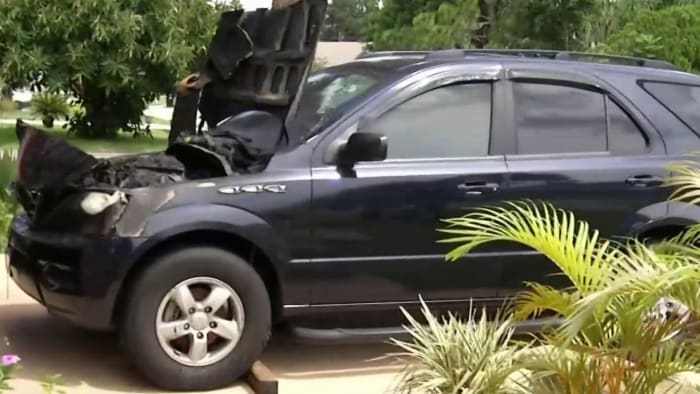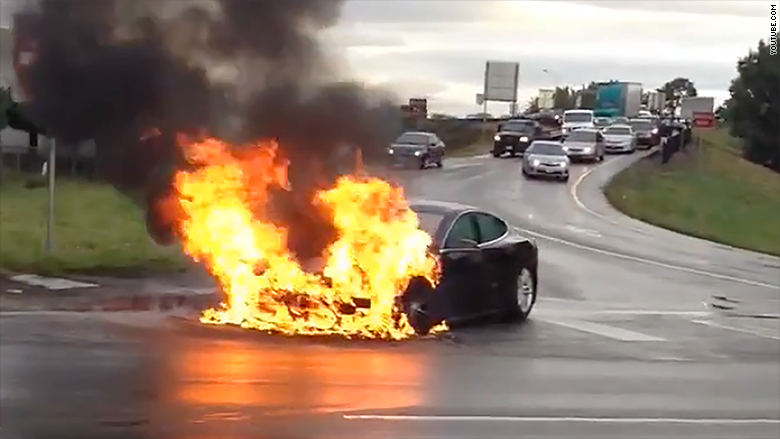Burning Electric-Vehicle Batteries Complicate Efforts to Fight Fire on Drifting Ship in Atlantic Ocean
The incident could raise questions about the safety of ferrying EVs over long distances at sea
The Felicity Ace, a cargo ship carrying thousands of cars including Porsches and Bentleys to the port of Davisville, R.I., caught fire last week and was adrift in the mid-Atlantic. Burning electric vehicle batteries complicated efforts to battle the blaze.
By William Boston Wall Street Journal
Updated Feb. 20, 2022
The large number of electric vehicles on board a ship that is drifting ablaze in the Atlantic Ocean is complicating efforts to extinguish the fire, the Dutch experts contracted to salvage the vessel said Sunday.
It is unclear whether the blaze was caused by the electric cars, whose lithium-ion batteries have been known to catch fire, but the presence of burning batteries on board means SMIT Salvage, the company contracted to rescue the ship, is facing fire that spreads fast and cannot be fought with water alone, the company’s owners said.
“The cars are electric and part of the fire is the batteries that are still burning,” said a spokesman for Royal Boskalis Westminster NV, which owns SMIT Salvage and the company that freed the ship Ever Given after it became stranded in the Suez Canal last year. The spokesman added that it was too early to say how SMIT would put out the battery fires.
The 60,000-ton Felicity Ace merchant ship was carrying around 4,000 cars from Germany to the U.S., including 1,100 Porsche sports cars and 189 super-luxury Bentleys, which are all units of Volkswagen AG, when it caught fire last Wednesday, leading to the evacuation of the 22 crew members. It has been drifting just off the Azores islands since. The fire is the latest in a string of supply-chain setbacks to befall an auto industry that has faced production bottlenecks due to a shortage of components and Covid-19-related disruptions to international-trade routes.
Although it will be months before the cause of the fire is known, the blaze on the Felicity Ace, one of the first major fires during a transport of electric vehicles, also raises questions about how to safely transport such vehicles in the future.
The fire on the Felicity Ace led to the evacuation of the 22 crew members. The ship has been drifting just off the Azores.
For days, spokesmen for the car makers have declined to provide details to the public about the models on board the ship, but Portuguese navy officials monitoring the vessel and salvage workers fighting the blaze say based on cargo lists they have it is clear that many of the cars on board are electric vehicles. VW and its brands export electric models such as Porsche’s Taycan, Audi’s e-tron, and VW’s ID.4 from Germany for sale in the U.S.“The fire continues to be active, although it has diminished in intensity,” said João Manuel Mendes Cabeças, captain of the nearest port on the island of Faial in the Azores. “The expectation is that everything or almost everything burned.” Over the weekend, SMIT Salvage piloted its Phor B tug boat to douse the sides of the boat with water as smoke continued to billow out of the decks high above. Footage of the scene showed the hull was bruised and scarred from the heat inside.
The Portuguese navy isn’t directly involved in efforts to quell the fire but is monitoring the ship at sea for signs of instability and leakage. Capt. Cabeças, who is coordinating the navy’s operation, told The Wall Street Journal that he spoke to the ship’s captain when he arrived on shore after the crew was rescued by the Portuguese air force.
According to the ship captain’s initial statements to Capt. Cabeças, alarms alerted the crew Wednesday morning to a fire on Deck 1, just above the main deck. Crew members rushed to Deck 1 but smoke prevented them from entering the cargo hold, Capt. Cabeças said. This prompted the captain to abandon the ship. The ship’s captain couldn't be reached for comment.
Among several commercial ships that came to assist the Felicity Ace was the Resilient Warrior, a Liberia-flagged 81,817-ton oil tanker, that was en route from Ingleside, Texas, to Rotterdam, Netherlands, according to a vessel-tracking site. The tanker took crew members on board to await rescue by the Portuguese air force.
The air force posted a video of the rescue operation on YouTube, showing its EH-101 Merlin helicopter lifting the Felicity Ace crew members off the deck into the aircraft. They were removed from the Resilient Warrior in two groups of 11 and taken to the island of Faial.





